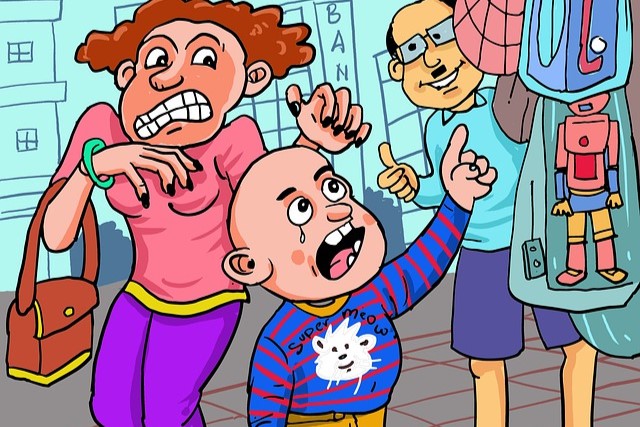Behavioral Goals for a Child's Emotional Growth

"Your mind is a garden, your thoughts are the seed….you can grow flowers, or you can grow weeds." –Anonymous
Nurturing social and emotional growth is essential for children's overall well-being. Setting behavioral goals provides a framework for children to cultivate positive habits, enhance their social skills, and develop emotional intelligence. Goalstar Rewards is a remarkable platform that empowers parents to guide their children in goal-setting, tracking progress, and celebrating achievements in the realm of social and emotional development. In this article, we will explore the significance of setting behavioral goals for children and provide effective strategies for parents to utilize Goalstar Rewards in fostering their child's social and emotional growth.
The Importance of Setting Behavioral Goals
Behavioral goals play a vital role in supporting children's social and emotional growth. Here's why they are essential:
Self-Awareness and Self-Regulation
Setting behavioral goals helps children develop self-awareness, enabling them to understand their emotions, triggers, and reactions. It fosters self-regulation, empowering them to manage their emotions and behavior effectively.
Relationship Building and Communication
Behavioral goals provide children with a framework to cultivate healthy relationships and effective communication skills. They learn to listen actively, empathize with others, and resolve conflicts constructively.
Empathy and Compassion
Setting behavioral goals encourages children to practice empathy and compassion towards others. They learn to understand and respect different perspectives, fostering a sense of kindness and inclusivity.
Emotional Intelligence and Resilience
Behavioral goals promote the development of emotional intelligence. Children learn to recognize and understand their own emotions and those of others, enhancing their ability to navigate social situations and cope with challenges resiliently.
Responsible Decision-Making
By setting behavioral goals, children develop skills in responsible decision-making. They learn to consider the consequences of their actions, make thoughtful choices, and align their behavior with their values.
Effective Goal-Setting Strategies for Parents
Collaborative Goal-Setting
Involve your child in the process of setting behavioral goals. Have open conversations about the importance of social and emotional growth, and together, identify specific areas for improvement and develop actionable goals.
Define Clear and Measurable Goals
Ensure that behavioral goals are clear, specific, and measurable. Use language that is understandable and actionable for your child. For example, "Listen actively during conversations" or "Express emotions appropriately."
Break Goals into Manageable Steps
Help your child break behavioral goals into smaller, achievable steps. This approach makes the goals more attainable and allows for a sense of progress as they accomplish each step along the way.
Leverage Goalstar Rewards
Utilize the features of Goalstar Rewards to track your child's behavioral goals. Create a personalized dashboard to monitor their progress, use visual cues to represent milestones achieved, and provide recognition and rewards for their efforts.
Model and Reinforce Positive Behavior
Be a positive role model for your child by demonstrating the behaviors you want them to develop. Provide consistent reinforcement and praise when your child exhibits positive behavior aligned with their goals.
Encourage Reflection and Self-Assessment
Foster self-reflection in your child by encouraging them to assess their own behavior and progress. Help them identify areas of growth and celebrate their successes along the way.
Promote Peer Interaction and Support
Encourage your child to engage in activities that promote peer interaction and social skills development. Encourage participation in group projects, clubs, or community activities where they can practice their behavioral goals with peers.
Regularly Review and Adjust Goals
Periodically review your child's goals together. Assess their progress, discuss challenges they may be facing, and make any necessary adjustments to the goals to ensure they remain relevant and achievable.
Conclusion
Setting behavioral goals is a powerful tool for fostering social and emotional growth in children. By utilizing Goalstar Rewards, parents can actively support their child's development in these areas. Through collaboration, tracking progress, and celebrating achievements, parents can empower their children to cultivate positive behaviors, develop strong relationships, and navigate emotions effectively. Embrace the power of behavioral goal-setting and unlock your child's social and emotional potential with Goalstar Rewards.
GSR Tips & Tricks
How best to use Goalstar Rewards to help your child achieve their goals? How It Works
Enjoy 4 weeks of free trial for each child. Register to Start 4 Weeks Free Trial!
The following link provides some very valuable guidance on social and emotional intelligence in pre-teens:
•Pre-teens: social & emotional development
Frequently Asked Questions
Why is social emotional development important for children?
Social emotional development is crucial for children as it helps them build self-awareness, empathy, resilience, and communication skills. It lays the foundation for healthy relationships, emotional well-being, and success in various aspects of life.
What are examples of social and emotional development?
Examples of social and emotional development include developing self-control, understanding and expressing emotions, taking turns, showing empathy, forming friendships, resolving conflicts, and cooperating with others.
How do you develop a child's social and emotional development?
To develop a child's social and emotional development, it is important to provide opportunities for play and social interaction, encourage open communication, model positive behaviors, teach problem-solving skills, promote empathy and understanding, and create a supportive and nurturing environment.
What are the three main aspects of social emotional development?
The three main aspects of social emotional development are self-awareness (recognizing one's own emotions and thoughts), self-management (regulating emotions and behaviors), and social awareness (understanding and empathizing with others).
What is the social and emotional development of a 5 to 7 year old?
At this age, children develop friendships, begin to understand and regulate their emotions better, show empathy towards others, follow rules and take turns, and start to develop a sense of identity and self-esteem.
What is the social and emotional development of a pre-teen?
During pre-adolescence, children experience increased independence, explore their identities, form stronger peer relationships, exhibit more complex emotions, face social pressures, and develop a greater understanding of societal norms and values.
What is the social and emotional development of a teenager?
Teenagers undergo significant changes in their social and emotional development. They seek independence, establish personal identities, navigate romantic relationships, experience a range of emotions more intensely, and develop critical thinking and decision-making skills.
How can parents support the social and emotional development of a child?
Parents can support their child's social and emotional development by actively listening and engaging in conversations, providing a nurturing and supportive environment, setting clear and consistent boundaries, encouraging positive social interactions, teaching problem-solving and conflict resolution skills, and being positive role models.
 \
\
